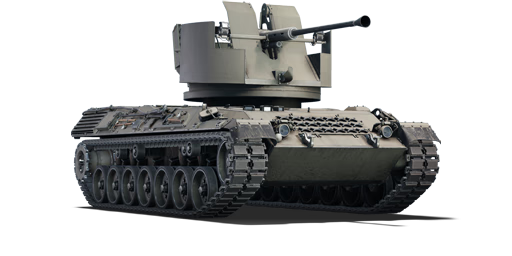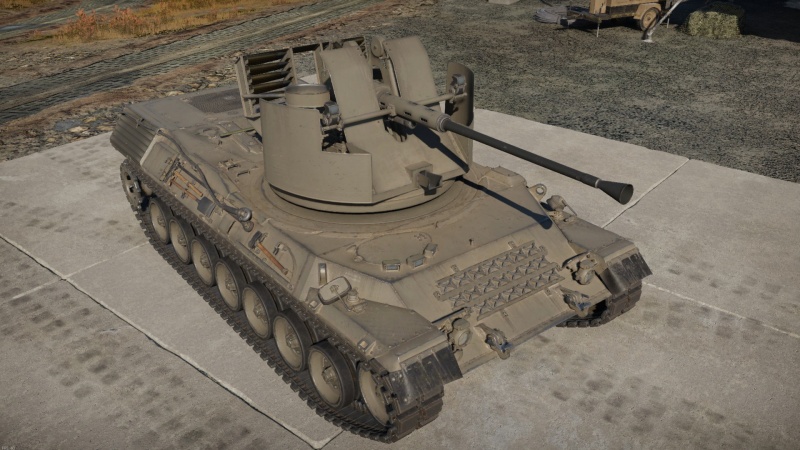Leopard 40/70
| This page is about the Italian SPAA Leopard 40/70. For other uses, see Leopard (Disambiguation). |
Contents
Description
The semovente controaerei Leopard Bofors da 40/70 is a prototype Italian anti-air platform made during the late 1990s. Its role was to aid the SIDAM 25 platform in shooting down enemy air targets and provide cover for armoured convoys. The Italian army would test it for several years but ultimately it would not see mass production.
Introduced in Update "Kings of Battle", the Leopard 40/70 has amazing mobility and strong firepower. Being based on the Leopard platform but without the original turret means that a lot of weight was saved when installing the Breda Bofors 40 mm cannon. As such, it is one of the most mobile vehicles at the battle rating. The 40 mm main armament is highly effective against ground and air targets, more so against enemy air as the amazing elevation angles allow you to be able to hit targets which are even directly above you. The main weakness of this vehicle is its armour and crew placement, most if not all enemy vehicles will be able to take you out in 1 shot. As such, it's best to try and flank as much as you can with this vehicle to take enemies by surprise and then quickly move to a different area to repeat the same strategy.
General info
Survivability and armour
The Italian Leopard Bofors da 40/70 does not have a high grade of survivability, its main weakness is the turret which similarly like other Anti-air vehicles by being open-top. This means that this platform can easily be taken out by even the lowest of machine gun fire, artillery and enemy aircraft. The frontal armour is reliable against APDS and AP rounds from many of the autocannons found around its battle-rating but struggles against chemical and armour-piercing rounds from dedicated tanks and tank destroyers. The side and rear armour however, is a different story. Offering only 30-60 mm of armour over most of the surface, it can be penetrated by most rounds fired from cannon calibre weapons. The crew placement also means that 1 clean shot at the centre mass of this vehicle would usually mean it being taken out completely. The ammunition is also stored behind the vehicle which depending on the scenario, could mean a swift exit from the match as its another big weakspot of this vehicle.
Armour type:
| Armour | Front (Slope angle) | Sides | Rear | Roof |
|---|---|---|---|---|
| Hull | 70 mm (60°) Upper Glacis
50 mm (50°) Lower Glacis |
35 mm Upper
30 mm Lower |
25 mm | 15-30 mm |
| Turret | ___ - ___ mm Turret front ___ mm Gun mantlet |
___ - ___ mm | ___ - ___ mm | ___ - ___ mm |
| Cupola | ___ mm | ___ mm | ___ mm | ___ mm |
Notes:
Mobility
Write about the mobility of the ground vehicle. Estimate the specific power and manoeuvrability, as well as the maximum speed forwards and backwards.
| Game Mode | Max Speed (km/h) | Weight (tons) | Engine power (horsepower) | Power-to-weight ratio (hp/ton) | |||
|---|---|---|---|---|---|---|---|
| Forward | Reverse | Stock | Upgraded | Stock | Upgraded | ||
| Arcade | 71 | 28 | 35.5 | 1,179 | 1,584 | 33.21 | 44.62 |
| Realistic | 66 | 26 | 734 | 830 | 20.68 | 23.38 | |
Modifications and economy
Armaments
Main armament
Give the reader information about the characteristics of the main gun. Assess its effectiveness in a battle based on the reloading speed, ballistics and the power of shells. Do not forget about the flexibility of the fire, that is how quickly the cannon can be aimed at the target, open fire on it and aim at another enemy. Add a link to the main article on the gun: {{main|Name of the weapon}}. Describe in general terms the ammunition available for the main gun. Give advice on how to use them and how to fill the ammunition storage.
| 40 mm Bofors DA 40/70 | Turret rotation speed (°/s) | Reloading rate (seconds) | ||||||||||||
|---|---|---|---|---|---|---|---|---|---|---|---|---|---|---|
| Mode | Capacity (Belt) | Fire rate | Vertical | Horizontal | Stabilizer | Stock | Upgraded | Full | Expert | Aced | Stock | Full | Expert | Aced |
| Arcade | 228 (4) | 240 | -5°/+90° | ±180° | - | 74.8 | 103.6 | 125.8 | 139.1 | 148.0 | 0.65 | 0.58 | 0.53 | 0.50 |
| Realistic | 50.6 | 59.5 | 72.2 | 79.9 | 85.0 | |||||||||
Ammunition
- Default: AP-T · HEFI-T*
- HE-I-T-M2: HEFI-T* · HEFI-T* · HEFI-T*
- IM219: AP-T · AP-T · AP-T
| Penetration statistics | |||||||
|---|---|---|---|---|---|---|---|
| Ammunition | Penetration @ 0° Angle of Attack (mm) | ||||||
| 10 m | 100 m | 500 m | 1,000 m | 1,500 m | 2,000 m | ||
| HEFI-T* | 12 | 11 | 10 | 8 | 6 | 5 | |
| AP-T | 93 | 90 | 77 | 63 | 51 | 42 | |
| Shell details | ||||||||||||
|---|---|---|---|---|---|---|---|---|---|---|---|---|
| Ammunition | Velocity (m/s) |
Projectile mass (kg) |
Fuse delay (m) |
Fuse sensitivity (mm) |
Explosive mass (TNT equivalent) (g) |
Ricochet | ||||||
| 0% | 50% | 100% | ||||||||||
| HEFI-T* | 1,005 | 0.96 | 0.1 | 0.1 | 128 | 79° | 80° | 81° | ||||
| AP-T | 1,005 | 0.96 | - | - | - | 47° | 60° | 65° | ||||
Ammo racks
| Full ammo |
1st rack empty |
2nd rack empty |
3rd rack empty |
4th rack empty |
5th rack empty |
6th rack empty |
Visual discrepancy |
|---|---|---|---|---|---|---|---|
| 57 | __ (+__) | __ (+__) | __ (+__) | __ (+__) | __ (+__) | __ (+__) | __ |
Usage in battles
Describe the tactics of playing in the vehicle, the features of using vehicles in the team and advice on tactics. Refrain from creating a "guide" - do not impose a single point of view but instead give the reader food for thought. Describe the most dangerous enemies and give recommendations on fighting them. If necessary, note the specifics of the game in different modes (AB, RB, SB).
Pros and cons
Pros:
- Great off and on-road mobility for an Anti-air platform
- Fast firing 40mm autocannon
- Able to engage both enemy ground and air vehicles effectively
- Amazing turret traverse and elevation angles
Cons:
- Weak armour, pretty much any tank at its battle rating can penetrate it from all sides
- Open top turret, very big weakspot which enemies can easily abuse
- Poor crew placement, most being in the turret meaning a clean shot at centre mass will result in the vehicle being knocked out
- Ammunition all stored at the rear, another big weakspot for enemies to take advantage of
- Vehicle profile is tall and long so keeping this vehicle hidden can be hard at times
History
The story of the Leopard Bofors da 40/70 would begin during the late 1990s. Decades earlier, Italy had managed to not only buy but also licence-produce the Leopard 1 main battle tank. The Italian army was equipped with several variants of the Leopard tank, initially a small batch of Leopard 1A1s, which were then later upgraded to Leopard 1A2s. Years later, Italy would be one of the biggest users of the Leopard 1 tank, mainly thanks to OTO Melara who were producing them non-stop. Italy was no stranger to modifying the Leopard platform and at one point a study was conducted which aimed to equip the Italian army's Leopard 1A1s with the Italian-made "Thetis" thermal imager system: only a singular prototype was completed. That wasn't it however, Italy would also test the OTOMATIC anti-air turret by mounting it on the Leopard, and although that showed positive results, it also wouldn't be picked up. One of if not the very last modification to the Leopard platform by Italy would come in the form of the Leopard Bofors da 40/70.
During the late 1990s, the arsenale di Piacenza was tasked by the Italian ministry of defence to create a low cost self-propelled anti-air platform by reusing surplus Bofors cannons and the vast amount of Leopards (which were soon to be replaced by the C1 Ariete) as a base for this vehicle. It didn't have any radar or special optics, its main role was to supplement the SIDAM 25 anti-air vehicle in armoured convoys and aid it in shooting down air threats. Its armament consisted of a 40 mm Bofors cannon which was primarily used to engage enemy aircraft, however due to the various 40 mm rounds made at the time, there was also the possibility for it to be used against ground-based targets if it was ever tasked to do so. Italy would test it for a couple of years; the only upside which was found was the fact that it would be easy to produce and wouldn't require a lot of work to convert the old Leopards to fill this role. The vehicle also boasted a decent mobility as removing the old Leopard turret and replacing it with the Bofors meant that it was much lighter than before. However, everything else discovered during testing was mostly negative. When compared to newer anti-air platforms, even ones made by Italy itself, the vehicle was subpar. In particular, the lack of radar and any form of search and tracking meant that its use on a modern battlefield would be negligible. As such, the project was dropped with 1 or 2 prototypes being completed. Italy would stick with the SIDAM 25 and the old Leopard hulls were sent to the Lenta military scrapyard.
Media
- Skins
See also
Links to the articles on the War Thunder Wiki that you think will be useful for the reader, for example:
- reference to the series of the vehicles;
- links to approximate analogues of other nations and research trees.
External links
Paste links to sources and external resources, such as:
- topic on the official game forum;
- other literature.
| Italy anti-aircraft vehicles | |
|---|---|
| R3 Capraia | R3 T20 FA-HS |
| SIDAM 25 | SIDAM 25 · SIDAM 25 (Mistral) |
| Wheeled | AS 42 · CM52 |
| Tracked | M42 Contraereo · Leopard 40/70 · OTOMATIC |
| Hungary | ◔ZSU-57-2 · ◔ZSU-23-4 |





